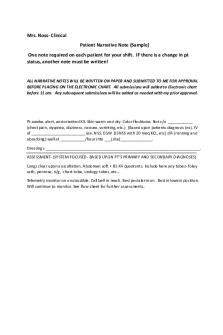Sample Case Note - Re Liveri PDF

| Title | Sample Case Note - Re Liveri |
|---|---|
| Author | Fiona Liu |
| Course | Legal Principles and Skills |
| Institution | Deakin University |
| Pages | 2 |
| File Size | 90.1 KB |
| File Type | |
| Total Downloads | 102 |
| Total Views | 131 |
Summary
Download Sample Case Note - Re Liveri PDF
Description
Case note – Re Liveri CITATION Re Liveri [2006] QCA 152 COURT Supreme Court of Queensland – Court of Appeal Full Court: de Jersey CJ, McMurdo P and Williams JA. PROCEDURAL HISTORY Legal Practitioners Admission Board – the applicant’s first application for admission as a legal practitioner was refused. The applicant did not appeal this decision. Supreme Court, Court of Appeal – the applicant’s second application was also opposed by the Admissions Board and appealed by the applicant. The Court of Appeal referred questions of fact to the Trial Division, at which point the applicant withdrew her application. Supreme Court, Court of Appeal – this is the applicant’s third application for admission, again opposed by the Board on the basis that the applicant has not demonstrated she is fit for admission. FACTS During her time at University, the applicant was found guilty of academic misconduct for – submitting the work of a published academic as her own for the purposes of an assignment; and quoting substantial commentary from other sources without properly attributing this material to the respective authors in another two assignments. Not until her current (and third) application for admission did the applicant make adequate disclosure of and take responsibility for her actions, previously maintaining that the use of the material of others was ‘inadvertent’. ISSUE Is the applicant a fit and proper person to be admitted as a legal practitioner? LAW S 30 Legal Profession Act 2004 (Qld) – applicant for admission must be a ‘fit and proper person’. Re AJG [2004] QCA 88 – ‘Legal practitioners must exhibit a degree of integrity which engenders in the Court and in clients unquestioning confidence in the completely honest discharge of their professional commitments. Cheating in the academic course which leads to the qualification central to practice and at a time so close to the application for admission must preclude our presently being satisfied of this applicant’s fitness.’
1
REASONING/DECISION No, the applicant not currently fit for admission as a legal practitioner. The applicant committed serious plagiarism more than once. Additionally, she was then unwilling to acknowledge her misconduct which showed a lack of insight into its gravity and significance. RATIO ‘Her unwillingness, subsequently, to acknowledge that misconduct, establishes a lack of genuine insight into its gravity and significance: for present purposes, where the Court is concerned with fitness to practise, that aspect is at least as significant as the academic dishonesty itself.’ (emphasis added) Students note also: repeating Re AJG [2004] QCA 88 – ‘legal practitioners must exhibit a degree of integrity which engenders in the Court and in clients unquestioning confidence in the completely honest discharge of their professional commitments’.
OBITER If an applicant is to reapply having been denied admission, the Court will have to be convinced that they are subsequently fit for admission – the mere passage of time since the misconduct occurred is generally not sufficient of itself to prove this fitness (particularly with conduct such as this, coupled with a failure to acknowledge its seriousness). [It should go without saying that an applicant seeking admission to the legal profession should not have to be warned about the unacceptability of cheating in the course of securing the pre-requisite academic qualification.]
ORDER(S) Application adjourned to a date to be advised, not to be before six months has passed. The applicant will need to re-advertise her intention to apply for admission.
ANALYSIS Significance of the case – failure to recognise the seriousness of misconduct is at least as significant as the academic dishonesty itself. Can you see a similarity between this case and Re Saunders? E.g. lack of surrounding information (to give adequate disclosure) and court taking dim view of lack of acknowledgement of true nature of conduct (didn’t realise was criminal, was ‘inadvertent’).
2...
Similar Free PDFs

Sample Case Note - Re Liveri
- 2 Pages

Case note final - case note
- 12 Pages

Formative Case Note - Case note
- 1 Pages

Case Summary Re Ryan
- 1 Pages

Sample narrative note
- 2 Pages

Nydam v R CASE NOTE - case note
- 3 Pages

In re Andrews - Case Brief
- 1 Pages

Northouse Case 2 - Case Note
- 3 Pages

Case grid to case note
- 3 Pages

Writing case notes - case note
- 1 Pages

SOAP Note 2 Graded.docx Sample
- 5 Pages

Case Note Structure
- 1 Pages

LLB02 Torts Case Note
- 13 Pages
Popular Institutions
- Tinajero National High School - Annex
- Politeknik Caltex Riau
- Yokohama City University
- SGT University
- University of Al-Qadisiyah
- Divine Word College of Vigan
- Techniek College Rotterdam
- Universidade de Santiago
- Universiti Teknologi MARA Cawangan Johor Kampus Pasir Gudang
- Poltekkes Kemenkes Yogyakarta
- Baguio City National High School
- Colegio san marcos
- preparatoria uno
- Centro de Bachillerato Tecnológico Industrial y de Servicios No. 107
- Dalian Maritime University
- Quang Trung Secondary School
- Colegio Tecnológico en Informática
- Corporación Regional de Educación Superior
- Grupo CEDVA
- Dar Al Uloom University
- Centro de Estudios Preuniversitarios de la Universidad Nacional de Ingeniería
- 上智大学
- Aakash International School, Nuna Majara
- San Felipe Neri Catholic School
- Kang Chiao International School - New Taipei City
- Misamis Occidental National High School
- Institución Educativa Escuela Normal Juan Ladrilleros
- Kolehiyo ng Pantukan
- Batanes State College
- Instituto Continental
- Sekolah Menengah Kejuruan Kesehatan Kaltara (Tarakan)
- Colegio de La Inmaculada Concepcion - Cebu


